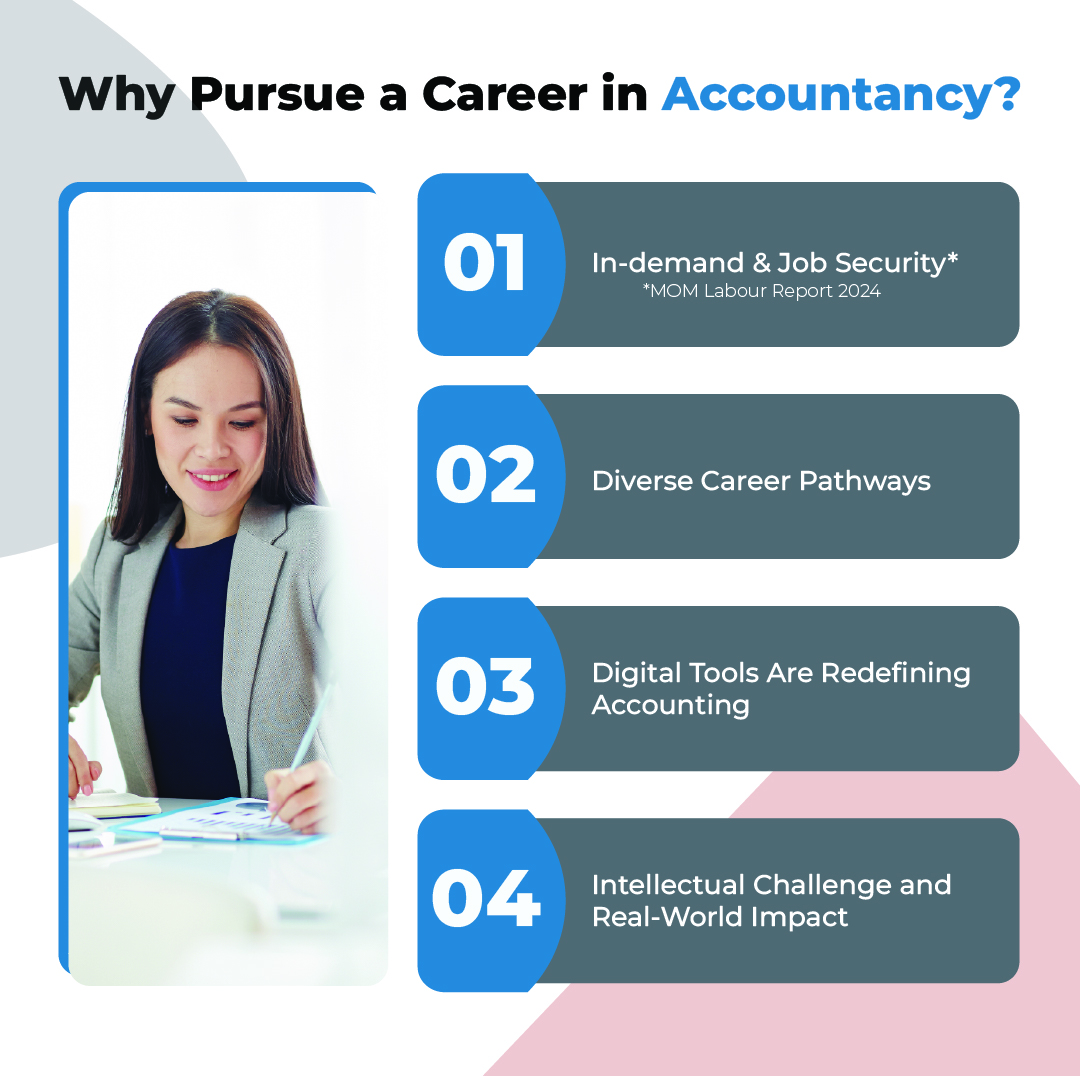When it comes to a career in accounting, most people immediately picture spreadsheets, calculators, and someone hunched over a desk doing taxes. Maybe you’ve even heard the old stereotype—that accountants are quiet number-crunchers tucked away while others get to do the “cool” work. But that image is due for a serious upgrade.
In today’s digital economy, what do accountants do? A whole lot more than you’d expect. From analysing big data to guiding major financial decisions, they play a key role in keeping businesses and entire industries running smoothly. Here’s why accounting might just be the hidden gem you’ve been overlooking.
Key Takeaways
- Accounting goes far beyond spreadsheets. What accountants do today includes analysing data, shaping strategy, and driving business decisions across all industries.
- Outdated stereotypes don’t reflect reality. Accountants today collaborate across teams, use digital tools, and play a strategic role in organisations.
- From reporting to advisory work, accountants have a hand in financial planning, tax compliance, audits, and business growth, making their role both varied and essential.
- Singapore offers diverse accountancy roles, including CPAs, CAs, tax specialists, and emerging fields like cryptocurrency
- A career in accounting offers strong demand, versatility, and long-term relevance, especially with the growing use of technology and data in business.
What Most People Get Wrong About What Accountants Do
Understanding the Stereotype vs. Reality
1. Accounting Is More Than Just Crunching Numbers
A lot of people still think accountancy in Singapore is all about doing math problems and balancing spreadsheets—but that’s a pretty outdated take. These days, what accountants do is more like solving puzzles with real-world impact. They look at numbers to find patterns, figure out what’s working (and what’s not), and help businesses make smarter choices.
2. The Image of a Solitary Accountant Is Outdated
If you picture accountants working alone in silence all day, it’s time to update that impression. Most accountants today are team players, collaborating with departments like HR, operations, and IT, and explaining financial information to people who don’t speak “finance.” Being a good communicator matters just as much as being good with numbers.
3. Accounting Isn’t “Boring”—It’s Business-Critical
Accounting might not sound flashy, but it’s one of the most essential functions in any business. You’ll usually find an accountant doing the groundwork behind major decisions, like launching a product, entering a new market, or cutting costs. They help companies stay stable, efficient, and forward-looking.
4. It’s Not Just for “Math People”
You don’t need to be a math whiz to do what accountants do. What really counts are your problem-solving skills, attention to detail, and ability to think logically. Many successful accountants come from diverse academic backgrounds—business, law, and even the arts. It’s a field that values ethical judgement and clear thinking just as much as technical know-how.
A Deeper Dive Into What Accounts Actually Do

To truly understand what accountants do, you need to look beyond the title and into the practical, behind-the-scenes work that keeps organisations running smoothly. From everyday operations to long-term strategy, here’s where accountants make their biggest impact:
1. Financial Reporting and Analysis
Accountants are primarily responsible for preparing key financial documents, like balance sheets, income statements, and cash flow statements. These reports tell the story of a company’s financial health—what’s coming in, what’s going out, and where money is being spent. Accountants also interpret these reports to uncover trends, flag red flags, and give decision-makers the insights they need to act with confidence.
2. Budgeting and Forecasting
Looking ahead is a big part of what accountants do. They use data from past performance and current market conditions to model future scenarios via revenue projections, cost estimates, and investment planning. These are crucial for helping businesses plan for growth, control costs, and navigate uncertainty, especially when the economy throws curveballs.
3. Tax and Compliance
Taxes are complicated, and getting them wrong can be expensive. Accountants help businesses navigate Singapore’s local tax system—such as GST requirements—and even cross-border regulations for companies operating internationally. They ensure timely, accurate tax filings and help firms take advantage of any tax deductions or incentives available. In doing so, they protect businesses from costly penalties and maintain a good standing with regulatory authorities like the Inland Revenue Authority of Singapore (IRAS).
4. Internal Controls and Audits
Companies need strong internal systems to keep things running efficiently and ethically—and that’s exactly what accountants help do. They assess financial processes to check for inconsistencies, prevent fraud, and make sure everything is in line with industry standards. Internal audits provide an added layer of assurance for management and stakeholders, as well as build integrity into everyday operations.
5. Advisory and Strategy Support
In more senior or specialised roles, accountants act as advisors to the business. They help leadership teams make high-stakes decisions using financial data, from pricing strategies and product launches to mergers and acquisitions. In these roles, what accountants do shifts from record-keeping to strategic partnerships, contributing to big-picture thinking. Their ability to translate complex financial information into actionable insights makes them valuable players in boardrooms and planning meetings.
Types of Accountancy Roles in Singapore

In Singapore, there’s a whole spectrum of accountancy specialisations, each with unique skill sets, responsibilities, and career paths. Here are some of the most common types of accountants that reflect the diversity of the field:
1. Certified Public Accountants (CPAs)
CPAs are recognised experts in accounting and auditing who have passed the Uniform CPA Examination and met other licensure requirements. These professionals often handle complex tasks like auditing large firms, preparing financial statements, and representing clients during tax disputes. While many work in public accounting firms, you’ll also find CPAs in corporate finance teams, government ministries, education, and consulting roles. What these accountants do is often high-stakes, especially in sectors like banking, law, and public policy.
2. Chartered Accountants (CAs)
Chartered Accountants perform a similar function to CPAs but are usually certified under different global or regional bodies, such as the Institute of Singapore Chartered Accountants (ISCA). They are experts in audit, tax law, and financial compliance. CAs often advise on business strategy and play an active role in mergers, acquisitions, and restructuring projects.
3. Tax Accountants
Every company needs to pay taxes, but no business wants to pay more than necessary. That’s where tax accountants come in. They specialise in understanding complex tax regulations and structuring financial transactions in a way that is both compliant and tax-efficient. They’re also the go-to professionals for things like handling audits from tax authorities or identifying areas for tax savings.
4. Cryptocurrency Tax Accountants
Cryptocurrency tax accountants help individuals and businesses navigate the tricky waters of digital finance. With digital currencies becoming more mainstream in Singapore, accountants in this space deal with everything from capital gains calculations to reporting decentralised transactions. It’s a highly specialised role that blends blockchain knowledge with traditional financial principles, highlighting just how quickly what accountants do is evolving with technology.
5. Certified Internal Auditors (CIAs) and Management Accountants (CMAs)
CIAs are professionals trained to evaluate internal systems and processes. They help organisations identify inefficiencies, reduce risks, and improve internal controls. CIAs are often involved in corporate governance and are key players in building stakeholder trust, especially in publicly listed companies or highly regulated industries.
On the other hand, CMAs focus on the analytical side of accounting. They specialise in budgeting, financial planning, and performance management. What sets CMAs apart is their focus on helping businesses make operational and strategic decisions based on internal financial data. In short, they help companies stay competitive and profitable.
Why Accounting Is a Smarter Career Choice Than You Think
Accounting may not be the flashiest career out there—but don’t let that fool you. From job stability and career flexibility to tech integration and global relevance, it checks a lot of boxes for those seeking long-term, meaningful work.
Advantages of Pursuing a Career in Accountancy

1. In-Demand and Job Security
Some careers rise and fall with trends, but accounting has staying power. Every business, from startups and government agencies to global corporations, relies on skilled professionals to manage finances, ensure compliance, and plan for the future.
According to the Ministry of Manpower’s (MOM) Labour Market Report 2024, the Legal, Accounting, and Management Services sector reported a 4.0% job vacancy rate—one of the highest among white-collar industries in Singapore. While vacancy rates have fluctuated over the years, rising from 2.0% in the MOM Labour Market Report 2020 to 6.0% in 2022, the broader trend points to a fairly resilient demand for accounting professionals in Singapore.
2. Diverse Career Pathways
One of the best things about what accountants do is that it doesn’t lock you into just one job. Once you’ve built a strong foundation, you can branch out into different industries or pivot into roles that suit your strengths and interests. If you prefer working behind the scenes, internal auditing or risk management could be your niche. On the other hand, if you enjoy big-picture thinking and influencing business direction, you may consider stepping into corporate strategy.
3. Digital Tools Are Redefining Accounting
Gone are the days of calculators and paper ledgers. Today’s accountants spend less time on manual ledger work and more on meaningful conversations with clients, thanks to real-time access to financial data via digital tools. Cloud-based platforms like Xero and Dext have also automated repetitive processes, such as transaction entry and receipt tracking, freeing accountants to focus more on advisory work. As technology continues to transform industries, there’s growing space for innovation in what accountants do and how they contribute to modern business.
4. Intellectual Challenge and Real-World Impact
If you enjoy solving problems and thinking strategically, you’ll appreciate the depth of this profession. Accounting is about more than keeping the books in order—it’s about making sense of complexity, managing risk, and helping businesses stay resilient. From building financial models to advising on major budget decisions, what accountants do can significantly influence whether a business grows, adapts, or struggles. It’s a career that demands critical thinking and rewards curiosity, precision, and lifelong learning.
How to Become an Accountant in Singapore

Interested in building a career around what accountants do, but not sure where to begin? Whether you’re a student, a mid-career professional, or someone exploring a new path, there are clear steps you can take to get started—and grow.
1. Start with a Foundational Course or Diploma
A diploma in accounting or business is a great entry point for anyone looking to build solid fundamentals. You’ll learn essential topics like bookkeeping, budgeting, and financial reporting, all while gaining hands-on exposure to what accountants do every day. At PSB Academy, we offer full-time, part-time, and online diploma programmes designed for flexibility—perfect for full-time students or working adults. It's a practical and accessible way to build confidence in basic accounting skills before moving on to more advanced study.
2. Progress to a Bachelor’s Degree
To deepen your expertise and expand your career options, consider progressing to an accounting degree. At PSB Academy, students can choose from a selection of programmes that offer both academic rigour and industry relevance.
The Bachelor of Science with Honours in Accounting and Finance from Coventry University combines the twin disciplines of accounting and finance, covering accounting techniques, business strategy, taxation, and more. The programme is also recognised by leading professional bodies such as the Association of Chartered Certified Accountants (ACCA), the Institute of Chartered Accountants in England and Wales (ICAEW), and ISCA.
Another option is the Bachelor of Commerce from the University of Newcastle, Australia, which provides a robust foundation in business and economic principles. Students can graduate with majors in accounting or finance. The programme is also accredited by the Association to Advance Collegiate Schools of Business (AACSB)—an honour held by only the top 6% of business schools worldwide.
These courses are designed to help graduates move confidently toward advanced roles in accountancy, finance, and beyond.
3. Pursue Professional Certification
To strengthen your professional credentials, consider pursuing certifications such as CPA, ACCA, or CA Singapore. These designations are globally recognised and reflect mastery of what accountants do at an advanced level. Earning one typically involves a mix of coursework, exams, and industry experience, but it’s often well worth the investment.
At PSB Academy, several degree pathways are designed to support your progression toward certification, each offering different exemption benefits:
- Bachelor of Commerce (University of Newcastle, Australia): Exemptions for up to 9 ACCA papers.
- Bachelor of Science with Honours in Accounting and Finance (Coventry University): Exemptions for up to 9 ACCA papers, 4 ICAEW papers, and 5 Singapore CA Qualification (SCAQ) papers. Students will also enjoy instant ISCA student membership upon enrolment.
- Bachelor of Arts with Honours in Accounting and Finance for International Business (Top-Up) (Coventry University): Exemptions for up to 7 ACCA papers after graduation. Graduates may also enrol in the Singapore Chartered Accountant Qualification (SCAQ)
4. Consider Postgraduate Qualifications for Leadership Roles
If your goal is to move into executive leadership, consultancy, or strategic finance roles, a master’s in finance, accounting, or business administration can set you apart. These courses explore advanced topics like governance, risk management, and financial strategy. They also sharpen soft skills like communication, negotiation, and decision-making—qualities that are increasingly critical in high-level finance jobs in Singapore.
Frequently Asked Questions
1. Do I need to be good at math to become an accountant?
Not necessarily. You’ll need to be comfortable with numbers and basic calculations, but accounting is more about understanding systems, applying logic, and paying attention to detail than solving advanced equations. At PSB Academy, foundational modules are designed to build your confidence in these areas—even if you’re not a “math person”.
2. What’s the difference between bookkeeping and accounting?
Bookkeeping is more transactional, focusing on recording daily financial data. Accounting takes that data and turns it into insights, guiding decision-making, compliance, and strategy. What accountants do often builds on the foundation created by bookkeepers, adding a layer of interpretation and planning that drives business growth.
3. Can I switch to accounting mid-career?
It depends. Having prior experience in business, admin, or operations can be a real asset when enrolling in an accounting diploma or degree programme. These can give you useful context for understanding what accountants do in different organisational settings. At PSB Academy, there are flexible business and accountancy programmes designed to support mid-career learners on their journey.
Kickstart Your Accounting Journey with PSB Academy

What accountants really do is far more meaningful, strategic, and future-ready than the old stereotypes suggest. Whether you’re helping a company manage risk, interpret financial data, or prepare for a digital future, you’re making an impact.
Curious about entering the field? There’s no shortage of ways to begin! Explore PSB Academy’s diverse range of programmes—from diploma and degree courses to postgraduate options—to support both fresh learners and working adults looking to upskill or make a change. Our offerings are also regularly reviewed by an Industry Advisory Panel, allowing students to learn what’s relevant and not just what’s in the textbook.
Enquire now to find the right programme for you.




 TOP
TOP





